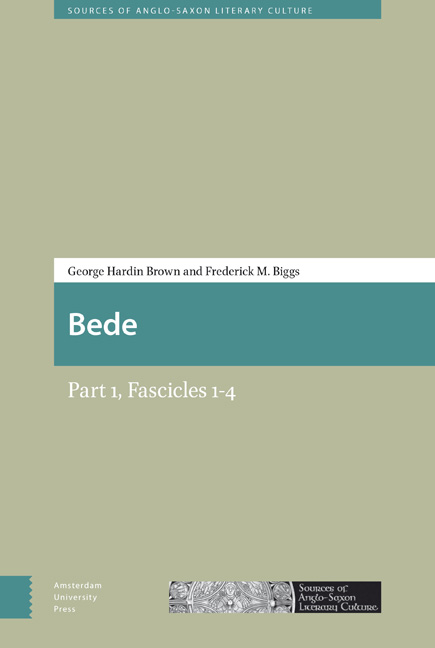Poetry: Epigrams
Published online by Cambridge University Press: 02 February 2021
Summary
From the list of his works at the end of the HISTORIA ECCLESIASTICA GENTIS ANGLORUM(ed. Lapidge 2010 2.484; trans. Colgrave and Mynors 1969 p 571), it is certain that Bede not only wrote epigrams, but also gathered them together into a volume since he included “a book of epigrams in heroic and elegiac metre” (“librum epigrammatum, heroico metro siue elegiaco”). Because this work has not survived, it has fallen to scholars, particularly Michael Lapidge (1996b pp 314-20, 357-79, 508, and 510-12; and 2008a pp 120-26), to sort out what can be said about its contents. Two kinds of works were certainly included: dedications (tituli ) for churches and epigraphs for books. Standing midway between these two would be tituli composed, if indeed Bede did compose them, to adorn lavish books such as the Codex Amiatinus, as well as, perhaps, verses to close a book, if indeed this was the purpose of Lector adesto UIGIL. Also likely to be part of his collection would be moral sententiae, which could cover his paraphrases of the Psalms and perhaps the O DEUS AETERNAE MUNDO SPES UNICA UITAE, also known as the Oratio Bedae. It might also have contained epitaphs. In the absence of firm information, all of these short works will be gathered here, where they are arranged in alphabetical order of their incipits. Preceding these entries is a more general one on the lost LIBER EPIGRAMMATUM, which includes a discussion of the individual genres, but which should not obscure the fact that many if not all of these works would have circulated in other forms, such as at the beginnings of the works they introduced. The entry Liber epigrammatum also discusses briefly another category, AENIGMATA, even though there are no accepted examples of Bede's work in this genre. Finally, before turning to Bede's Latin epigrams, one poem in Old English, BEDE's DEATH SONG, will be considered because it is similar in theme to some of these works.
Bede's Death Song[BDS (A33)].
ed.: ASPR 6.107.
MSS – Refs
none.
In his EPISTOLA DE OBITU BEDAE, CUTHBERTrelated that among the verses of scripture and antiphons that Bede repeated during the days of his final illness was a five-line poem in Old English.
- Type
- Chapter
- Information
- BedePart 1, Fascicles 1-4, pp. 217 - 240Publisher: Amsterdam University PressPrint publication year: 2017



